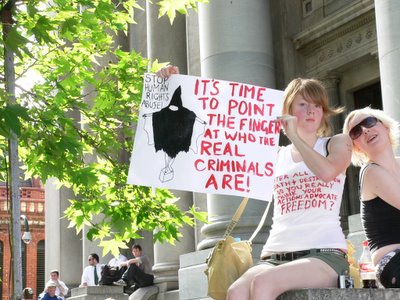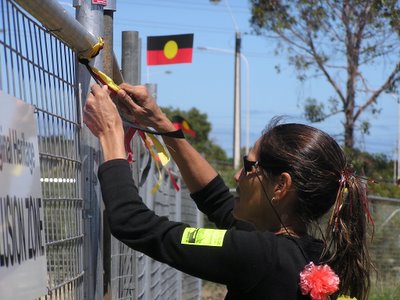Rumsfeld’s visit reveals liberties threat

The visit by US Defence Secretary Donald Rumsfeld to Adelaide last week turned the normally sedate city upside-down. Barricades were erected around the Town Hall and in front of the Hyatt hotel. Roads around the Town hall were closed to traffic and the eastbound lane of North Terrace was closed for much of its length. Traffic chaos was the result. The Lord Mayor was shown in the media conducting business from a city café; he and the councillors had been excluded from the city’s usual administrative centre. Their place of work had been taken over and made the venue for a meeting of Australian and US Government big-wigs known as the Australia-US Ministerial Meeting (Ausmin).
Around 500 police took part in a massive security operation to protect Rumsfeld and Deputy US Secretary of State Bob Zoellick from the supposed twin threat of terrorist attack and peace demonstrations. A group called the Rice Rumsfeld Reception Committee (RRRC) had been planning to protest the visit of one or other of the hawkish Bush Administration heavies for some time and organisers were expecting about 1,000 people to gather on the steps of Parliament on the first day of the two-day Ausmin event.
With just two days to go to the demonstration, the atmosphere created by the secrecy and disruption suddenly became more sinister. The media reported that Parliament House authorities had denied permission for the protest. The police were threatening to arrest participants and had told organisers firstly that anybody refusing to move on would be arrested, then that anybody inciting violence would be detained, then that anybody inciting protests would be “dropped out”.
The RRRC resolved to go ahead with the peaceful protest as close as they could get to the steps of Parliament. Meanwhile, the unprecedented decision of the Parliament’s presiding officers had sparked a furore. Democrats state leader Sandra Kanck said the decision was an attack on free speech by the authorities. "They give lip service to it but when it comes to the actual event we're finding that we are not in a position to be able to say what we want to say and I think it's just bloody outrageous," she said.
RRRC spokesperson Mike Khizam said “this shows why the rally is necessary, and what the ‘anti-terror’ laws are really about. They are about further eroding civil rights, especially the right to protest, and not about protecting Australia.”
“And yet we are seeing the influence of these new laws in action even before they have passed into law”, claimed Mr. Khizam. “Donald Rumsfeld, a man whom many millions of people around the world see as an international war criminal is coming to Adelaide, and in the name of ‘protecting’ him, free speech is being denied and the right to dissent attacked.”
On the eve of the planned peaceful protest, the Speaker of the Lower House Independent MP Bob Such responded to growing public indignation and overturned the protest ban. Adelaide had been spared a new, dramatic escalation of the gagging of public debate that still hangs over the Australian public with the brace of new “anti-terror” and sedition laws. Needless to say, there was no attack on the visiting Bush Administration luminaries and the protests, including a 1,000 strong demonstration on the steps of Parliament, passed largely without incident. However, the public has been put on notice that unless they take resolute action, their right to protest can be withdrawn without debate and with no notice.

